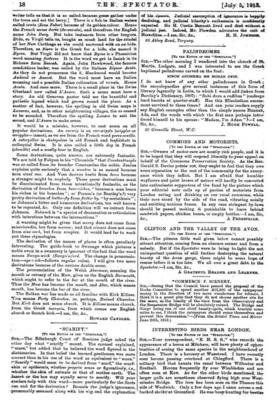CURIOUS AND FANTASTIC DERIVATIONS.
[To THE EDITOR OF THE "SPECTATOR."]
SIR,—It is the genius of all languages, and especially of the- English language, to attempt, in transferring a word from a foreign tongue, to spell it so as to produce some familiar meaning from the sound of the word. Thus ecrevisse becomes tray fish though it is not a fish, and, similarly, cockroach and titmouse are not, respectively, roach and mouse; the plural of titmouse is titmouses, and ;titmice is as hideous a plural as Germen would be as a plural for German.
In earlier days, before etymology became a science founded on history and the laws of word-formation and modification, mistakes like those above were very common. There is a double error in spelling gillyflower July-flower, and Jenneton June-eating. Some such mistakes are very curious. Ranun- culus sceleratus, so called from its acrid qualities, should nob be rendered celery-leaved crow foot, as if the name came from the shape of the leaves ; nor is it probable that Johnson and Bailey are right in telling us that the gooseberry is so called " because it is eaten with green geese as sauce." [An old UrriMr tells us thatit -is so called because geese gather under the trees and eat the berry.] There is a fish in Italian waters *tiled- orate (Zeus Faber) because of its golden-colour. Hence the.French name dorie (de-aurata), and therefrom.the English name John Dory. But take instances from other tongues. Dido, so Virgil tells. us, bought as much land for t,1;te citadel of her New Carthage as she could surround with an ox-hide. Therefore, as 01,pee is the Greek for a hide, she named it Byrsa. But Virgil did not know that Byrsa is a Phoenician word meaning fortress. It is the word we get in Isaiah in its Hebrew form Bosrek. Again, John Hawkwood, the famous condettiere leader, was called by the Italians Signor Acuto. As they do not pronounce the h, Hawkwood would become ..Awkood or Aucoot. But the word must have an Italian meaning ands possible Italian collocation of vowels. Hence Acute. And once more. There is a small place in the Swiss Oberland now called L'Avare. Such a name must have a story. An old Genevan pastor told me the beautiful and pathetic legend which had grown round the place. As a matter of fact, however, the spelling in old Swiss maps is Lavaraz, and, as in other neighbouring villages, the az ceased to be sounded. Therefore the spelling Lavare to suit the sound, and L'Avare to make sense.
It would be a mistake, however, to cast scorn on all popular derivations. An earwig is an ear-wiggle (wiggler or -wriggler= insect), as we see from the French word perce-oreille. A caterpillar is ehatepelose in old French and teufelskatz in colloquial Swiss. It is also called a little dog in French (chenille) and a woolly-bear in English.
Some derivations, quite sincere, are extremely fantastic. We are told by Fabyan in his " Chronicle that Constantinople was so called from its founder Constantine the noble. Junius explains quite seriously that a wanton is so named because inen want one. And Voss derives hostis from n-Tis because a stranger might be anybody. These queer derivations must be discriminated from those intentionally fantastic, as the -derivation of breeches from bear-riches, " because a man bears his riches in his breeches "; or Porson's (or Bentley's?) very pretty derivation of butter-fly from flutter by, "by metathesis " ; or Johnson's bitter and humorous derivations, too well known to be repeated, &e. Only one definition will we extract from Johnson. Network is "a species of decussation or reticulation with interstices between the intersections."
A warning might be given that mercy does not come from snisericordia, but from coerces; and that sincere does not come from sine cerd, but from simplex. It would lead far to work out these etymologies.
The derivation of the names of places is often peculiarly interesting. The guide-book to Swanage which pictures a noble swan in a swannery is ignorant of the fact that the word means Sweyn-wick (Sweyn's-ford. The change in pronuncia- tion—aye = ick—follows regular rules). I will give two more -derivations because of the curious double error.
The pronunciation of the Welsh Abermaw, meaning the mouth or estuary of the Maw, gives us the English Bar mouth, which ought to refer to the bar at the mouth of the river. Thus the Maw has become the mouth, and Ober, which means mouth, has become the bar of the river.
The Balkan war has made us all familiar with Kirk Kilisse. This. means Forty Churches, or, perhaps, Ruined Churches. But Kirk does not mean church. It is Kilisse means church, from the Greek ieexaete, from which comes our English 'church or Scotch kirk.—I am, Sir, Ste., . HOWARD CANDLER.



















































 Previous page
Previous page